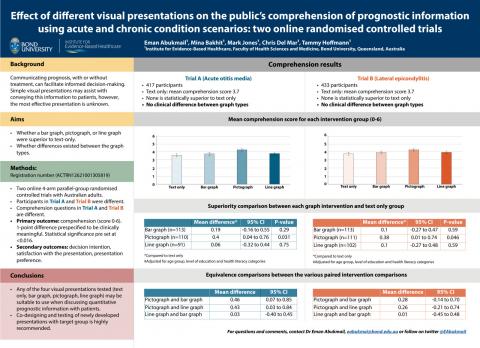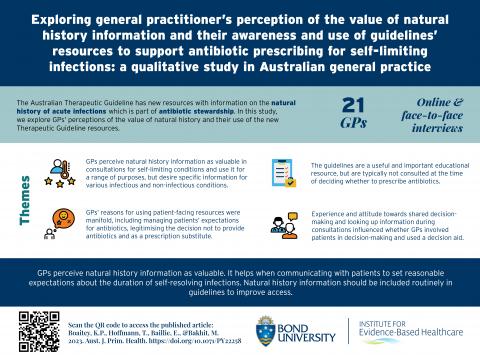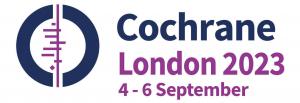IEBH Newsletter: June 2023
Latest research

In 2019, we invented the two-week systematic review (2weekSR) methodology, to complete full, PRISMA-compliant systematic reviews in approximately 2 weeks. Since then we have continued to develop and adapt the 2weekSR methodology for completing larger and more complex systematic reviews, including less experienced or inexperienced team members. The Journal of Clinical Epidemiology has just published the case series.
Read the full article here.

Clinical decision aids (CDAs) help clinicians with patient risk assessment. However, there is little data on CDA calculation, interpretation and documentation in real-world ED settings. The ABCD2 score (range 0–7) is a CDA used for patients with transient ischaemic attack (TIA) and assesses risk of stroke, with a score of 0–3 being low risk. The aim of this study was to describe ABCD2 score documentation in patients with an ED diagnosis of TIA.
Read the full article here.

Effect of different visual presentations on the public's comprehension of prognostic information using acute and chronic condition scenarios
Findings from 2 RCTs suggest that if prognostic information is clearly displayed, any of the tested visual presentations (text only, bar graph, pictograph, or line graph) can be used to convey this information to the public.
Read the full article here.
(click on image to open in new window)

This qualitative study provides a deeper insight into what Australian GPs think about having natural history information for self-limiting infections. It is time to make the information routinely available to help reduce antibiotic prescribing and use.
Read the full article here.
(click on image to open in new window)
Access all
Graduation

On 16 June 2023, Christoph Schnelle graduated with his PhD thesis titled: What makes an exceptionally good doctor?
"A British Medical Journal (BMJ) special edition concluded that we don’t know what makes a good doctor and therefore can’t learn from them. My PhD shows that to know what makes a good doctor you first need to prove that doctors themselves make a difference to a patient’s physical health beyond the intervention, patient risk factors, and all other known factors, and therefore there are better and worse doctors. Astonishingly this was not an established science when I started my PhD. Two systematic reviews which reviewed over 10,000 journal articles, and a methodological review showed that doctors themselves make an at times large difference to patients’ physical health and that some doctors are exceptionally good. In a qualitative study I interviewed 13 doctors who all knew and were deeply impressed by exceptionally good doctors and such doctors are as likely to be praised and vilified, with the latter being a big cultural issue. Lastly, my amazing supervisor, Associate Professor Mark Jones, and I surveyed 500 members of the public, most of whom experienced an exceptionally good doctor, and doctors who willingly listened to the end were especially valued and considered to be particularly knowledgeable and honest. The better the public valued the exceptionally good doctor, the more critical they were of the average doctor. We now know there are good doctors, how to find them, and have examples of those who learned from them." - Christoph
Systematic Review Accelerator
To represent the expansion and growth of the Systematic Review Accelerator (SRA) to other types of evidence synthesis, e.g. scoping reviews, umbrella reviews, network meta-analysis and narrative review, the SRA has undergone a name change.
It will now be known as the Evidence Review Accelerator (ERA), representing "a new ERA in research evidence review and synthesis".
Methods Wizard tool update
The Methods Wizard is an online collaborative research tool used to design and write systematic reviews and other types of evidence synthesis. It is easy to use, get started by clicking the “Create New Project”, fill in the details of your review, then click the "Generate output" button and it will write the methods section of your review for you.
As a result of feedback from our users, we have updated the Methods Wizard with a significant number of improvements. The updated version of the Methods Wizard combines an improved user interface, an introduction section, a detailed research plan, acknowledgments, and even more questions in each section to help new users navigate the intricacies of doing a review.
The addition of an introduction section means your introduction is now stored in the same place as your methods, the acknowledgments section will now make the contributions of all people involved in the review clearer. In addition, the research plan links to the websites of the appropriate automation tool and the research sections in your methods. The research plan is fully customizable and allows authors to be assigned to tasks. Additional tasks can be added or deleted, and when a task is finished, this can be noted in the completed column.
All these additions and upgrades will now make conducting a review easier than ever before.
https://sr-accelerator.com/#/methods-wizard
Workshops
In July and October, the Institute will be hosting a series of workshops on automation tools to:
- improve the speed of conducting;
- improve the speed of writing and designing;
- create efficient search strategies; and
- improve the efficiency of screening studies for evidence synthesis.
Cost: AUD$65 per workshop
Evidence-Based Practice Professorial Unit (EBPPU)
EBP Workshops
Between 12 May - 16 June, the EBBPU team presented a number of Evidence-Based Practice Workshops to around 20 staff from the Infectious Diseases Department at the Gold Coast University Hospital.
GCHHS staff from the Allied Health Department are invited to attend the next series of Evidence-Based Workshops to be presented in 2 parts:
- Part 1: 29 August 2023 from 2-4pm
- Part 2: 5 September 2023 from 2-4pm
For more information on the EBPPU or any of the workshops, please contact us:
More news

The GoldNet Research Network hosted a virtual journal club entitled “Nicotine vaping for smoking cessation” on 29 June 2023.
For more information on the GoldNet Research Network, visit their website: https://www.goldnetresearch.com.au/.
Click here to download the presentation and watch a recording of the journal club below:
Oops, something went wrong.
Upcoming conferences
-
Preventing Overdiagnosis
This 3-day face to face conference will include a number of lively plenary debates about controversial and timely issues, involving high-profile players from across the health care landscape. Our aim is to identify and explore desired change and the implications to all stakeholders. Attendees will gain a deeper awareness of the existence of overdiagnosis, its harms and impact on individuals’ health, on health care and the practice of medicine, and on society. Attendees will learn to apply specific concepts, methods and tools for reducing overdiagnosis, and identify next steps, individual or collective, to improve health outcomes, and reduce harm and wasted resources related to overdiagnosis.
https://www.cebm.ox.ac.uk/upcoming-events/preventing-overdiagnosis
-
Cochrane
The team at ISEHC are delighted to invite you to the 10th International Conference of EBHC Teachers & Developers, joint meeting with the 10th Conference of the International Society for Evidence-Based Health Care. The Conference will focus on how the COVID-19 pandemic has impacted the ecosystem of evidence and what future challenges should be faced to connect the generation, synthesis and translation of evidence to individuals and populations.
It is essential now more than ever that a consensual commitment is made to provide support to Evidence-Based Healthcare.
-
GIN

The 2023 Colloquium is an event for everyone with an interest in the use of evidence in healthcare decision making including those engaged in evidence production, co-production, dissemination, implementation and policy making, as well as those making individual healthcare decisions.
-
ISEHC

The Royal Australian College of General Practitioners (RACGP) is the official host of the Wonca 2023 world conference to be held in Sydney, Australia from 26-29 October 2023. The program will be curated to inform, engage, and provoke discussion around the core themes and align with the conference theme; 'Recovery, reconnection and revival. A celebration of primary care'.
-
WONCA
Join the Guidelines International Network at their 18th annual conference, an opportunity for their members and colleagues across the guideline world to network, connect and collaborate.
The theme this year will explore: “Maintaining quality while pursuing efficiency.”
This 3-day face to face conference will include a number of lively plenary debates about controversial and timely issues, involving high-profile players from across the health care landscape. Our aim is to identify and explore desired change and the implications to all stakeholders. Attendees will gain a deeper awareness of the existence of overdiagnosis, its harms and impact on individuals’ health, on health care and the practice of medicine, and on society. Attendees will learn to apply specific concepts, methods and tools for reducing overdiagnosis, and identify next steps, individual or collective, to improve health outcomes, and reduce harm and wasted resources related to overdiagnosis.
https://www.cebm.ox.ac.uk/upcoming-events/preventing-overdiagnosis
The team at ISEHC are delighted to invite you to the 10th International Conference of EBHC Teachers & Developers, joint meeting with the 10th Conference of the International Society for Evidence-Based Health Care. The Conference will focus on how the COVID-19 pandemic has impacted the ecosystem of evidence and what future challenges should be faced to connect the generation, synthesis and translation of evidence to individuals and populations.
It is essential now more than ever that a consensual commitment is made to provide support to Evidence-Based Healthcare.

The 2023 Colloquium is an event for everyone with an interest in the use of evidence in healthcare decision making including those engaged in evidence production, co-production, dissemination, implementation and policy making, as well as those making individual healthcare decisions.

The Royal Australian College of General Practitioners (RACGP) is the official host of the Wonca 2023 world conference to be held in Sydney, Australia from 26-29 October 2023. The program will be curated to inform, engage, and provoke discussion around the core themes and align with the conference theme; 'Recovery, reconnection and revival. A celebration of primary care'.
Join the Guidelines International Network at their 18th annual conference, an opportunity for their members and colleagues across the guideline world to network, connect and collaborate.
The theme this year will explore: “Maintaining quality while pursuing efficiency.”
Contact us
Bond University
Building 5, Level 4
14 University Drive, Robina QLD 4226